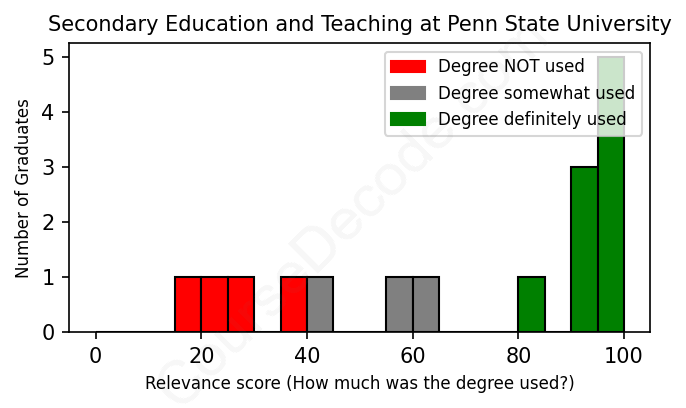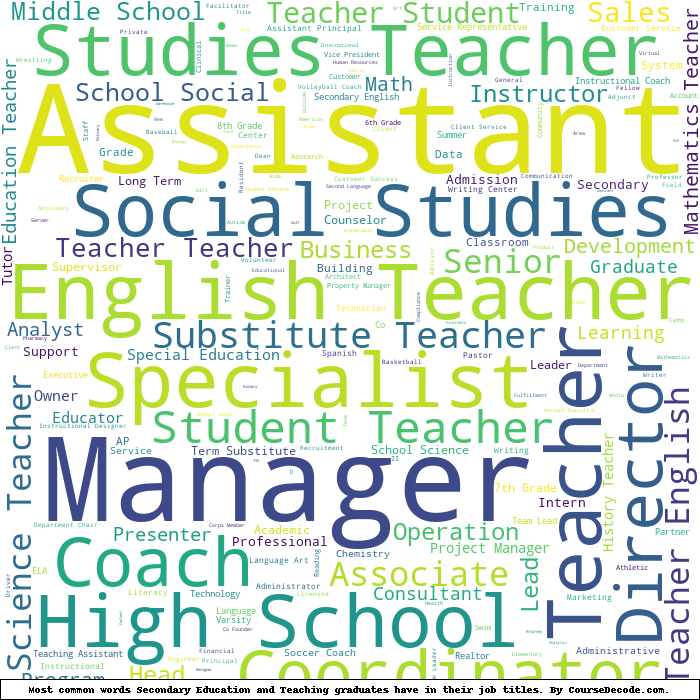
First, some facts. Of the Secondary Education and Teaching graduates from Penn State University we've analyzed , here's how many have used (or NOT used) their degree in their career:

These are estimates based on AI analysis of 16 LinkedIn profiles (see below).
The verdict? Slightly above average. Overall, with an average relevance score of 70%, Secondary Education and Teaching graduates from Penn State University have a slightly higher likelihood (+3%) of finding work in this field compared to the average graduate across all fields:
And for comparison, here's the chart for all profiles we've looked at across all degrees.
Also, after graduating, 37% of these graduates have pursued further education other than another Bachelor's degree (such as a Masters degree or other), compared to the average across all profiles of 35%. This suggests you may need more than just a Bachelors degree to be competitive as a Secondary Education and Teaching graduate.
See the details:
|
Relevance score: 35% We think this person has NOT gone into a career related to their degree. We think this person has NOT gone into a career related to their degree.
DEGREE INFOGraduated in 2015 from Penn State University with a Bachelor of Science (B.S.) in Secondary Education and Teaching. No other secondary education since. JOB HISTORY SINCE GRADUATIONSamples Technician Johnson Matthey Aug 2016 - Nov 2016 Sales Manager  Gap Inc./ Gap Jun 2015 - Apr 2016 Licensed Sales Producer  Allstate Feb 2017 - Jul 2018 Clinical research project assistant  PPD Aug 2018 - Apr 2020 Clinical Study Specialist  GSK Apr 2020 - Jun 2021 Senior Clinical Study Specialist  GSK May 2021 - Dec 2022 TMF Manager  inSeption Group Dec 2022 - Present ABOUTNo information provided. |
The top 10 most common jobs done by the graduates we've analyzed (ranked most common to least) are:
When looking at the jobs people with a degree in Secondary Education and Teaching from Penn State University have taken on, it seems that a majority have stayed close to the education field. Many of them have become teachers, whether it's as a high school social studies or math teacher, or even roles like adjunct professors. These positions clearly align with the skills and knowledge learned during their program, utilizing their expertise in curriculum design, classroom management, and subject content. Roles like "Homebound Teacher," "Substitute Teacher," and positions in educational leadership also show a strong correlation to their degree, affirming that many graduates have pursued careers directly in education.
However, not everyone followed that path. Some graduates have ventured into jobs that are quite far removed from education, like real estate agents, logistics managers, or even clinical research positions. In these cases, the relevance to their degree is often minimal at best. While there are transferable skills like communication and problem-solving learned in education, these roles don't engage the specific pedagogical principles developed during their studies. So, while a lot of folks have successfully pursued careers in education, some have drifted into other fields where their degree is not as directly tied to their day-to-day work. It's a mixed bag overall!
Here is a visual representation of the most common words in job titles for Secondary Education and Teaching graduates (this is across all Secondary Education and Teaching graduates we've analyzed, not just those who went to Penn State University):

Looking at the career paths of graduates from Penn State University with a degree in Secondary Education and Teaching, it's clear that many of them initially land jobs in education-related roles. Right after graduation, a good number start out as teachers or substitute teachers, which aligns with their studies and prepares them for a career in the classroom. For those who graduated around 2011 to 2013, many stuck to teaching, taking roles such as high school teachers or adjunct professors. Others ventured into different fields over time but still leaned on skills they've developed, showing a mixture of dedication to education and exploring other interests.
Fast forward five to ten years after graduation, and the picture becomes a bit mixed. While some have remained dedicated to education, transitioning into roles like instructional coaches, educational specialists, or becoming even higher-up administrators, others have moved into completely unrelated fields. For instance, some graduates shifted to positions in corporate training or compliance, demonstrating that the skills gained in education—like communication, organization, and leadership—are transferable. Overall, while a significant portion of these graduates found stable careers in education, there are indications that some have gone on to explore new paths, which could suggest either a quest for better opportunities or changes in personal interests.
Getting a Bachelor’s degree in Secondary Education and Teaching at Penn State can definitely be a challenging journey, but it’s also super rewarding if you’re passionate about teaching. The program typically involves a mix of coursework in educational theory, psychology, and specific subjects you plan to teach, plus hands-on teaching experiences like student teaching, which can be pretty demanding. Balancing all the projects, assignments, and prepping for your teaching practicum can feel overwhelming at times, but it’s not out of reach if you manage your time well. Overall, it’s about average in difficulty compared to other education programs—you’ll need to stay on top of your studies, but if you love working with students and learning about education, it can be a fulfilling experience.
Most commonly, in the LinkedIn profiles we've looked at, it takes people 4 years to finish a Bachelor degree in Secondary Education and Teaching.
Looking at the careers of these Penn State Secondary Education and Teaching grads, it's a bit of a mixed bag when it comes to making decent money. Some have been in teaching positions for years, which can be financially steady but not always lucrative. For example, the high school social studies teacher who also worked as an adjunct professor probably pulls in a decent income, especially if they worked their way up in salary over time. On the other hand, careers like the compliance analyst and clinical study specialist seem to be more lucrative based on their roles in corporate settings. Meanwhile, those who transitioned into coaching or real estate appear to have sought out more diverse paths that could either do really well or struggle based on market conditions. Overall, it seems like while some are doing okay, others might be facing challenges in terms of salary, especially in education.
Here is a visual representation of the most common words seen in the "about" section of LinkedIn profiles who have a Bachelor degree in Secondary Education and Teaching (this is across all Secondary Education and Teaching graduates we've analyzed, not just those who went to Penn State University). This may or may not be useful:

Here are all colleges offering a Bachelor degree in Secondary Education and Teaching (ordered by the average relevance score of their Secondary Education and Teaching graduates, best to worst) where we have analyzed at least 10 of their graduates:
| College | Score | Count |
|---|---|---|
 Arizona State University Arizona State University
|
81 | 10 |
 University of Nebraska-Lincoln University of Nebraska-Lincoln
|
76 | 10 |
 Penn State University Penn State University
|
70 | 16 |